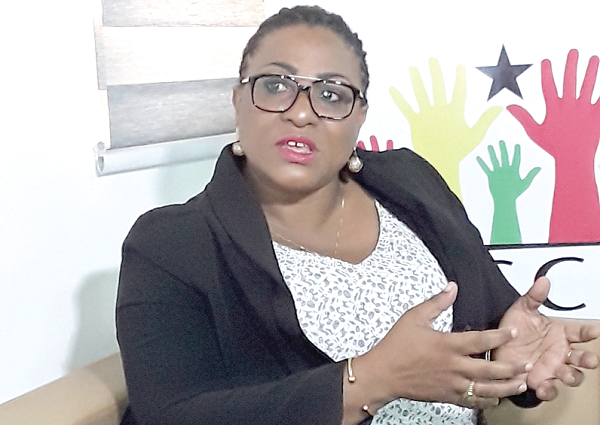
Let’s contribute to holistic national development agenda— NCCE
The Chairperson of the National Commission for Civic Education (NCCE), Ms Josephine Nkrumah, is upbeat about building a future generation of environmentally conscious citizens who will be prepared to contribute their quota to a holistic national development agenda.
“I believe that if as a nation we have to move forward, we need a healthy generation. A healthy generation inspired from a clean environment and at NCCE, we believe that is critical to making the gains we need to make as a nation,” she stressed.
Advertisement
She further indicated that a tax compliant citizen was also vital to ensure the holistic development of the country.
In a post-event appraisal of the 2018 edition of the Citizens Week celebration, the NCCE boss described the 2018 edition as unique in the sense that it was organised in two phases, a practice that was a departure from the past.
The phases, she explained, were organised under the commission’s broad theme: “Our Nation, Our Heritage: Consolidating Ghana’s Democratic Gains.”
Subsequently, the two phases were celebrated under two sub-themes: “Our Taxes Build a Great Nation” and “The Environment and You”.
The celebration was undertaken with funding support from the Ghana Revenue Authority (GRA) and the European Union (EU).
Problem of sanitation
Ms Nkrumah said the choice of a theme on sanitation was to create awareness among children in basic schools on their role in helping to maintain a clean environment.
“We are emboldening the youth to speak up against the problem of sanitation because
She said the two themes for the celebration were critical issues that affected the development of the nation and required deliberate interventions such as was being undertaken by the commission.
She noted that as a nation, much had been achieved in 25 years of its democratic practice and that going forward it was prudent to focus much energy on those who would become duty-bearers in the years to come.
Essence of paying taxes
On taxes, she said, if the country would develop to the level that all Ghanaians aspired to see and to achieve a Ghana beyond aid, “then it is important to speak to the generations ahead so that we are sure of growing a generation of young Ghanaians who will enter into the workforce understanding the essence of paying taxes.”
Equally important in targeting the youth, she said, was to ensure that they became peer influencers and beyond that became change agents for their parents, community and adult population.
“We believe that if we catch them at this
Impact of the celebration
Leveraging on the successes chalked-up over the years, Ms Nkrumah said the two engagements were impactful and gave an outcome of success at the end of the period.
The reason for that impact, she assessed, was because “there was heightened publicity before and during the engagements resulting in massive participation by the schools and resource persons from across the country.”
Giving the analysis for the first phase, she said, out of the national target of covering 10,000 schools, 8,040 schools were covered, giving 80 per cent coverage with a total of 992,789 pupils benefiting.
For the second phase, the commission, she said, maintained the same national target of 10,000 schools and registered a total coverage of 8,082 schools representing 81 per cent thus covering a total of 1,101,608 pupils.
The total coverage for the two phases as nationwide target quota, Ms Nkrumah said, stood at 20,000 while the attained target for the two phases was 16,122 basic schools nationwide that benefitted from the two engagements.
“It is worthy of note that despite the non-participation of those in Form Three in almost all the targeted schools engaged this year, there has been an increase in the number of schools engaged for both phase one and phase two engagements as compared to the number of schools covered in the 2017 edition,” she added.
Per a reflection in percentage terms, she said the two phases registered 80 and 81 per cent respectively as compared to 77 per cent for 2017 where there was full participation of those in Form Three, adding that “the non-participation of





